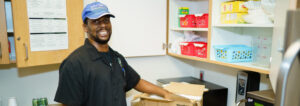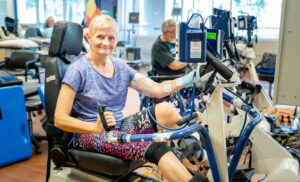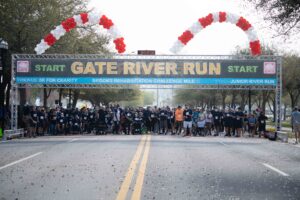Loss of Words
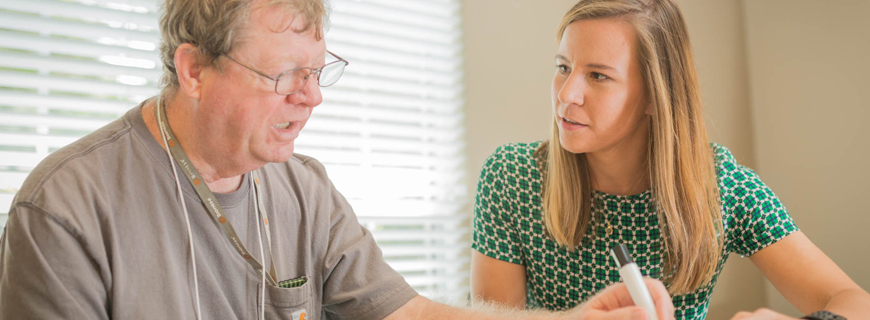
Back to physical health resource hub
The following story was originally posted in the personal blog of Molly McCune. The story highlights what McCune learned while interning at the Brooks Aphasia Center.
“One day I will find the right words, and they will be simple.” – Jack Kerouac
I firmly believe that I have chosen the best career. Okay, that is super subjective. Here’s an addendum: I firmly believe that I have chosen the best career for me. I am finishing up my third semester in graduate school now to become a Speech-Language Pathologist, and this semester, more than others, has reaffirmed that I have chosen the right career path. This semester I had the pleasure of doing my internship at the new Brooks Aphasia Center. Most of you are probably wondering what in the world aphasia is. I am going to explain it some in this post, but I challenge you to read about it more yourself, because we need to increase awareness.
Aphasia is a communication disorder that affects an individual’s language, not their intellect, usually caused by a stroke or traumatic brain injury. Their language can be affected in areas of expression, comprehension, reading, and writing; however, they are still as intelligent as they were before they had aphasia. That is extremely important to remember. These individuals know what they are trying to say, but sometimes the words just don’t come out right. Sometimes the words might not go in right, and they have a hard time understanding. One more time, just to make sure it’s clear, this is a problem with language, not intellect. Aphasia is hard to understand because it cannot be seen. Everyone understands a broken bone because there is physical evidence of the break. We can see it. With limited use in a cast, it will most likely heal. That is not the way it is for aphasia. Instead, the brain’s healing is a response to its use. This is based on the idea experience-based plasticity. The more experiences you have (in this case talking), the more your brain will wire and rewire for that exact function. So, everyday at the Aphasia Center when we talked, we were rewiring neural connections. How cool is that?
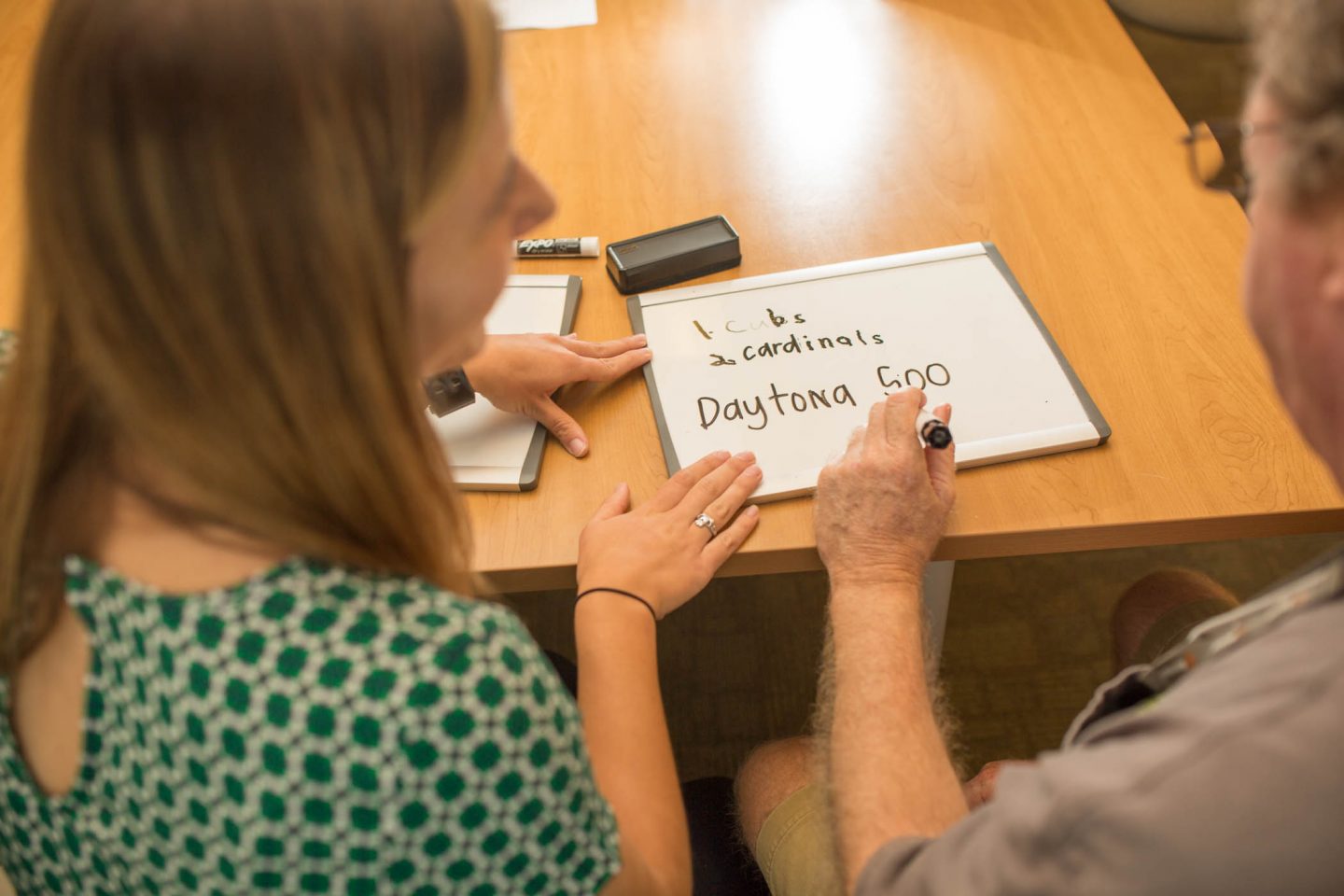 When I sat down to write about what my time at the Aphasia Center with all the wonderful people I got to be with meant to me, I found that I was at a loss for words. Imagine that. Sometimes when I want to write about something that is near and dear to my heart, I get nervous that I will not do it justice, and I lose my words. But, it’s better to try and fail rather than not try at all, I suppose. So, here I go… In the past three months that I have been here, while fully functioning as a human sponge, I learned so incredibly much from each member, and the SLPs that I had the pleasure of working with. I am so appreciative to them all for their help in my pursuit to become the best Speech-Language Pathologist I can be. Through the human-sponge absorption process, I learned more in my time at the center than textbooks and classes could ever teach me. I also learned a lot more about life than I expected. Here are just a few examples of some things I have learned from the members: People with aphasia have taught me more about…
When I sat down to write about what my time at the Aphasia Center with all the wonderful people I got to be with meant to me, I found that I was at a loss for words. Imagine that. Sometimes when I want to write about something that is near and dear to my heart, I get nervous that I will not do it justice, and I lose my words. But, it’s better to try and fail rather than not try at all, I suppose. So, here I go… In the past three months that I have been here, while fully functioning as a human sponge, I learned so incredibly much from each member, and the SLPs that I had the pleasure of working with. I am so appreciative to them all for their help in my pursuit to become the best Speech-Language Pathologist I can be. Through the human-sponge absorption process, I learned more in my time at the center than textbooks and classes could ever teach me. I also learned a lot more about life than I expected. Here are just a few examples of some things I have learned from the members: People with aphasia have taught me more about…
- Patience. We live in a crazy fast world, and all too often we don’t want to slow down. For anything or anyone. We are used to rushed conversations and not having to wait. Well, it’s not always easy for someone with aphasia to respond quickly. If you pile on questions, and they are still trying to answer the first, it is overwhelming. I think it is overwhelming for most people. Slow down. Have patience with people, wait, and give them time to speak their mind.
- Listening. Now, when I say listen I do not mean to hear someone. I mean to really listen. There were a couple of instances at the center that I thought I knew which way the conversation was going, and because I did not listen, it made communication harder. One of the first things we were taught at the Aphasia Center was, “Ask. Wait. Listen.” If we applied this to our everyday conversation, we would find that people often have much more to say than we realized.
- Support. Watching the members build each other up, push each other to find their words, and cheer when they were found is easily one of the most endearing things I have ever witnessed. People absolutely light up when they feel supported. Then they respond better and have more success in the future. Support those around you, and always build others up when you can.
- Humor. I learned more about humor and the fact that it has no boundaries. Aphasia does not stop people from having a sense of humor. Everyone in the center, SLPs included, were never afraid to laugh at themselves, laugh with others, and bring humor into group sessions. We all need to remember to never lose our laughter, and to never take life too seriously.
- The brain. Everyone, the brain is so cool. As if I haven’t already confessed my love for the brain…When someone has a stroke, part of the brain dies. Where aphasia comes in is if a language center is part of the affected area. However, through therapy, hard work, and the power of talking, new networks form to replace the damaged ones. The brain is being reshaped, rewired, and the individuals I work with are making new neural connections everyday when we talk. Who would have thought that coffee chat in the morning could be so beneficial? I feel absolutely honored that I get to be a part of the recovery process with these individuals.
- Doctors. No one can deny, doctors are brilliant individuals, but they don’t know everything. Many still say that an individual with aphasia won’t make any gains after the first year, and I am happy to say that is absolutely not true. I met individuals who were ten years post-stroke who made gains everyday in the center. I’m not saying don’t listen to your doctor, I’m just saying that I am overjoyed that they are wrong in this instance.
- Hardships. We don’t always see another person’s struggles. Aphasia is hard to understand because we cannot see it. This is true for many things in life. We don’t know the struggles that other people are going through that we cannot see. So, be nice.
- Perseverance. To some degree, every member struggles with language. Even with these struggles, I see everyone fight like hell daily to find the words to be a better communicator. Their dedication and motivation is inspiring.
- Passion. I chose to go into this field because when I was young my grandpa had a stroke and had aphasia himself. Following my passion has led me to an amazing career that I can honestly say I am excited for. Find your passion, and work your ass off to make your dream a reality.
Selfishly, I wish my time at the Aphasia Center was not over. Goodbyes are never easy for me. While I am sad that my time somehow passed me in the blink of an eye, I am also so appreciative for the time I got to spend with all of the amazing people I met. Every member has helped me get closer to my goal in life: to have an ugly heart. I know, I know, wanting an ugly heart sounds pretty bad. However, if you have not read my past blog that explains it, I will explain. You want an ugly heart because it will mean that you have lived. Truly lived. You’ve loved and lost, you’ve given part of your heart to people and places, you have had your heart broken to be put back together, sometimes not fully, with the help of God, family, friends, and yourself. An ugly heart is mismatched with pieces of other people’s hearts that they have given you as well. An ugly heart symbolizes a life lived. Everyone I met at the Aphasia Center definitely made my heart uglier, and I cannot thank them enough for it. A piece of my heart will always be attached to that place.
Words can only do so much when trying to express my passion for this community, and my desire to learn more and do more. I am so excited for what my future holds in this career. I have just learned that my next internship will be at the Mayo Clinic, and am excited for the new adventure that awaits! Stay tuned…
Always, Molly
